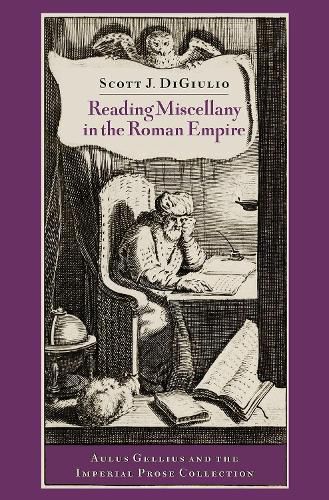Readings Newsletter
Become a Readings Member to make your shopping experience even easier.
Sign in or sign up for free!
You’re not far away from qualifying for FREE standard shipping within Australia
You’ve qualified for FREE standard shipping within Australia
The cart is loading…






Most classists have viewed Aulus Gellius' second-century text, the Noctes Atticae, as little more than a haphazard collection of short essays and excerpts by an amateur scholar. Often called a "miscellany," the Noctes Atticae collects vast amounts of otherwise lost ancient literature and records Gellius' experience of reading them. While the depictions of his scholarly activity have led some scholars to see in Gellius a kindred spirit--a Classicist avant la lettre--his work is often relegated to the second tier of Latin literature, considered either an unoriginal assembly of more sophisticated sources or too heterogeneous for Classicists to approach as a whole. Reading Miscellany in the Roman Empire, on the other hand, interprets the Noctes Atticae as a fundamentally literary collection that offers a profound meditation on the experience of reading and literary culture at the height of the Roman Empire. Incorporating textual analysis alongside narratology-informed approaches, Scott J. DiGiulio investigates the strategies used by Gellius to innovate within the Latin literary tradition and provides a framework for interpreting this text's perceived disorder on its own terms. The Noctes Atticae's self-conscious, miscellaneous aesthetic can enable us to probe the nature of reading during this moment in time, as Gellius' central preoccupation is articulating distinct "ways of reading," which DiGiulio argues we may use to navigate the web of literature in the Roman Empire. Gellius' use of material framing devices, focal characters, recurrent citations in dialogue with one another, and allusive references to other near-contemporary works can all be used as evidence that the evolution of prose as a literary form took place in the second century.
$9.00 standard shipping within Australia
FREE standard shipping within Australia for orders over $100.00
Express & International shipping calculated at checkout
Most classists have viewed Aulus Gellius' second-century text, the Noctes Atticae, as little more than a haphazard collection of short essays and excerpts by an amateur scholar. Often called a "miscellany," the Noctes Atticae collects vast amounts of otherwise lost ancient literature and records Gellius' experience of reading them. While the depictions of his scholarly activity have led some scholars to see in Gellius a kindred spirit--a Classicist avant la lettre--his work is often relegated to the second tier of Latin literature, considered either an unoriginal assembly of more sophisticated sources or too heterogeneous for Classicists to approach as a whole. Reading Miscellany in the Roman Empire, on the other hand, interprets the Noctes Atticae as a fundamentally literary collection that offers a profound meditation on the experience of reading and literary culture at the height of the Roman Empire. Incorporating textual analysis alongside narratology-informed approaches, Scott J. DiGiulio investigates the strategies used by Gellius to innovate within the Latin literary tradition and provides a framework for interpreting this text's perceived disorder on its own terms. The Noctes Atticae's self-conscious, miscellaneous aesthetic can enable us to probe the nature of reading during this moment in time, as Gellius' central preoccupation is articulating distinct "ways of reading," which DiGiulio argues we may use to navigate the web of literature in the Roman Empire. Gellius' use of material framing devices, focal characters, recurrent citations in dialogue with one another, and allusive references to other near-contemporary works can all be used as evidence that the evolution of prose as a literary form took place in the second century.